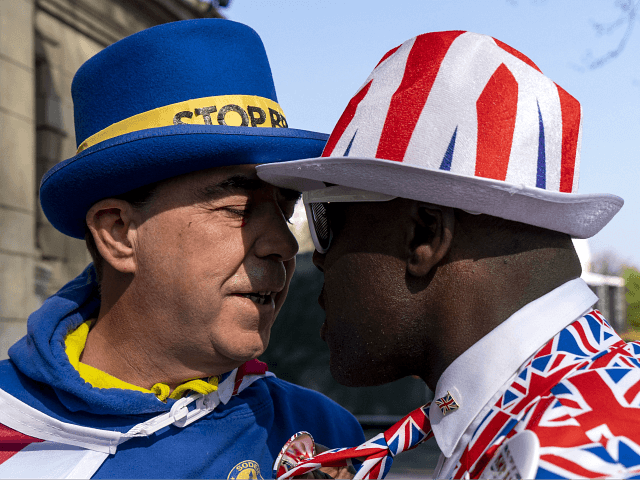Britons’ political identities are more strongly aligned along their positions on Brexit than by political affiliation, according to research by King’s College London.
Researchers at KCL’s Policy Institute found that 55 per cent of those surveyed say they “very strongly” identify with their position on the UK leaving the EU — up from 44 per cent last year. That proportion is more than twice those who say they very strongly identify with their political party (22 per cent).
Brexit is the biggest political debate in recent decades. Professor Bobby Duffy, Director of the Policy Institute at King’s College London, said that the findings “provide more evidence for the idea that British politics has changed dramatically in recent years” and that “people’s Brexit identities have got stronger and continue to trump party affiliations”.
Broken down by party affiliation, the survey of over 2,000 adults aged 18 to 75 found that under a third of Conservative (28 per cent) and Labour (27 per cent) supporters identify very strongly with their party. The Green party and Liberal Democrats have the lowest, both at just 13 per cent. The pro-EU, left-wing secessionist Scottish Nationalist Party have the highest proportion of strong affiliation at 45 per cent.
The research also found that Leavers feel slightly more positive feelings for Remainers than the opposite. When asked to rate the other with a “feeling thermometer” of 0 to 100, Leavers gave Remainers 23 while Remainers gave Leavers 19.
The parties have aligned themselves along Leave/Remain lines, with the Conservatives campaigning for an exit with a treaty, the Brexit Party lobbying for a clean-break Brexit, Labour pushing for a second referendum and many of its MPs backing Remain, and the Liberal Democrats, the most extreme of the Remain parties, calling for the cancellation of Brexit altogether.
The Lib Dems have held back on promoting their pledge to cancel Brexit after it proved unpopular on the doorstep, with polling finding that the more people saw of leader Jo Swinson, the less they liked her.
Swinson admitted on BBC Radio 4’s Today programme on Monday that the chance of a Liberal Democrat government revoking Article 50 “doesn’t look likely”. The admission comes after the Lib Dem leader claimed on Sky News on Sunday that her plan to reverse one of the biggest political mandates in British history is a “popular” policy.
Latest opinion polls have put the Tories a clear 10 per cent ahead of Labour. According to The Telegraph‘s data, the Conservatives have a polling average of 43.2 per cent compared to Labour, which is on 32.8 per cent.
While a Survation poll published on Monday gave the Conservatives a 14-point lead over Labour — 45 per cent to 31 per cent — up from nine points last week.
Prime Minister Boris Johnson is in the North of England and Wales for the next three days, campaigning in Labour Leave areas to woo the traditional left-wing voters with the warning that Jeremy Corbyn will betray Brexit.
On the narrowing gap in recent weeks between the Tories and Labour, polling specialist John Curtice told the Today programme that that was down to Remain voters migrating from the Liberal Democrats to Labour, rather than people changing their minds on Brexit.
“So, although we have seen the electorate move, the consequence for the race for Number 10 has so far basically been zero because Conservatives and Labour have simply matched each other.
“In other words, very few people have actually changed their mind in such a way that they’re now backing a pro-Brexit party when they were voting for a pro-second referendum party four weeks ago, or vice-versa,” Mr Curtice said.

COMMENTS
Please let us know if you're having issues with commenting.